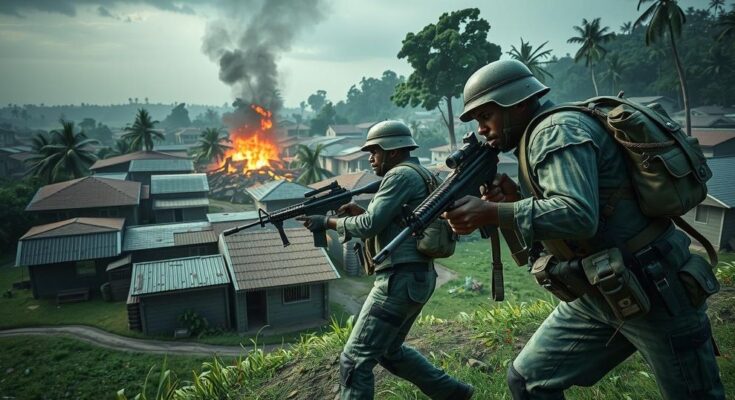Rwanda-backed M23 rebels have seized the town of Masisi in the DRC, marking their second territorial acquisition in two days. This incident exacerbates the humanitarian crisis in the region as the group expands its control since 2021, prompting significant displacement of local populations. Efforts at negotiation between DRC and Rwanda have stalled, raising concerns over regional stability.
Rebel forces associated with Rwanda have successfully taken control of the town of Masisi, located in the eastern region of the Democratic Republic of Congo (DRC). This seizure represents the M23 group’s second territorial gain in as many days within the resource-rich North Kivu province. Since its resurgence in 2021, the M23 has expanded its control over significant portions of eastern DRC, prompting the displacement of hundreds of thousands of Congolese individuals. Attempts by Angola to facilitate dialogue between President Félix Tshisekedi of the DRC and President Paul Kagame of Rwanda have faltered, as negotiations collapsed last month.
Alexis Bahunga, a member of the North Kivu provincial assembly, expressed profound concern regarding the takeover, indicating that it exacerbates the ongoing humanitarian crisis within the region. A local resident reported that the M23 conveyed to the townspeople their intention to “liberate the country.” Official comments from Congolese authorities regarding the loss of Masisi have yet to be released. Situated approximately 80 kilometers north of the provincial capital Goma, Masisi has a populace of about 40,000 and functions as the capital of the territory bearing its name. On the previous day, the M23 had also captured the nearby town of Katale.
Concerns were raised last year about a potential M23 advance toward Goma, a city with a population nearing two million, which the group previously occupied for a brief period in 2012. Following a temporary reduction in hostilities, fighting resumed in early December. The Rwandan government has not denied a United Nations report which states that approximately 4,000 Rwandan soldiers are assisting the M23 in DRC, simultaneously accusing the Congolese administration of insufficient action addressing persistent conflicts in the eastern regions. Rwandan officials have also alleged collaborations between the DRC authorities and elements accused of involvement in the 1994 Rwandan genocide against Tutsis and moderate Hutus.
The M23, originating as a faction of a preceding rebel movement when it was formed in 2012, claims to protect the Tutsi community in eastern DRC that has endured a history of marginalization and discrimination. Critics of Rwanda assert that the M23 is primarily utilized to extract valuable minerals, such as gold, cobalt, and tantalum, from eastern DRC, which are essential for manufacturing technologies, including mobile devices and electric vehicle batteries. In a related development, the DRC government has filed a lawsuit against Apple, concerning the utilization of these so-called “blood minerals.” Apple has responded by indicating a cessation of sourcing from the DRC.
The political dynamics surrounding the M23 group in the Democratic Republic of Congo are rooted in a complex history of ethnic conflict and regional instability. Formed as a splinter group in 2012, the M23 purportedly arose to safeguard the interests of the Tutsi population in eastern DRC, who faced persecution. Over the years, the group has seized control of significant territories, causing large-scale displacement and humanitarian crises. Rwanda’s involvement has been contentious, drawing criticism for its alleged support of the rebels as a means to exploit the region’s mineral wealth—an assertion backed by various international observers and analysts. The ongoing conflict highlights the broader issues of governance, accountability, and human rights violations in the region.
In summary, the recent capture of Masisi by Rwanda-backed M23 rebels marks a troubling escalation in the conflict within eastern DRC. This development not only heightens the humanitarian crisis but also underscores the complexity of regional politics involved in the DRC’s ongoing instability. As diplomatic efforts remain stagnant and violence resurges, the situation calls for renewed international attention and a concerted effort to address the underlying issues fueling this prolonged conflict.
Original Source: www.bbc.co.uk




